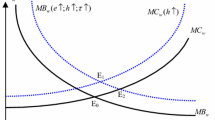Abstract.
We study three questions which are important for work sharing to increase employment. First, is there a negative long-run relation between working time and employment? Second, are hours per worker exogenous with respect to wages and employment? Third, can policy makers influence actual hours per worker? We formulate a theoretical model for employment, hours per worker, production, and real wages. A VAR model with cointegrating constraints is estimated by maximum likelihood using Swedish private sector data 1970:1–1990:4. We find (i) no long-run relation between hours per worker and employment, (ii) that hours per worker are endogenous with respect to the estimation of long-run parameters, and (iii) that legislated working time and hours per worker are related to each other in the long run.
Similar content being viewed by others
Author information
Authors and Affiliations
Additional information
First version received: September 1997/final version accepted: June 1999
Rights and permissions
About this article
Cite this article
Jacobson, T., Ohlsson, H. Working time, employment, and work sharing: Evidence from Sweden. Empirical Economics 25, 169–187 (2000). https://doi.org/10.1007/s001810050009
Issue Date:
DOI: https://doi.org/10.1007/s001810050009




